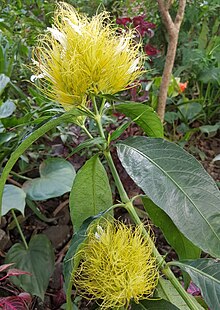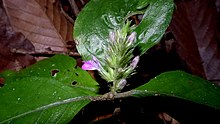Schaueria
| Schaueria | |
|---|---|

| |
| The golden plume () is widely cultivated as ornamentals | |

| |
| from Bahia, Brazil | |
| Scientific classification | |
| Kingdom: | Plantae |
| Clade: | Tracheophytes |
| Clade: | Angiosperms |
| Clade: | Eudicots |
| Clade: | Asterids |
| Order: | Lamiales |
| Family: | Acanthaceae |
| Subfamily: | Acanthoideae |
| Tribe: | Justicieae |
| Genus: | Schaueria Nees |
| Type species | |
Link & Otto
| |
| Species | |
|
See text | |
Schaueria is a genus of flowering plants in the family Acanthaceae. They are endemic to Brazil, from Bahia to Rio Grande do Sul. They are characterized by small elongated white or yellow flowers and narrow to thread-like green or yellow bracts. They are found mainly in rain forests, semi-deciduous mountain forests, and restingas. They are pollinated by bees and hummingbirds.[1]
The genus was established by the German naturalist Christian Gottfried Daniel Nees von Esenbeck in 1838.[2] It is considered monophyletic and includes fourteen species:[1][3]
- (Link & Otto) Nees
- (syn. Schaueria flavicoma)
- Nees
- (Nees & Mart.) Nees
- Nees
- A.L.A.Côrtes, T.F.Daniel, A.Rapin
- Nees
- (Vell.) A.L.A.Côrtes
- (syn. Schaueria lophura)
- A.L.A.Cortes & A.C.Mota
- Nees
- Nees
- (Rizz.) A.L.A.Côrtes, T.F.Daniel, A.Rapini
- (syn. Justicia paranaensis)
- (Leonard) T.F.Daniel
- A.L.A.Côrtes, T.F.Daniel, A.Rapini
- A.L.A.Côrtes, T.F.Daniel, A.Rapini
See also[]
| Wikimedia Commons has media related to Schaueria. |
References[]
- ^ a b Ana Luiza A. Côrtes; Alessandro Rapini & Thomas F. Daniel (2015). "The Tetramerium lineage (Acanthaceae: Justicieae) does not support the Pleistocene Arc hypothesis for South American seasonally dry forests". American Journal of Botany. 102 (6): 992–1007. doi:10.3732/ajb.1400558. PMID 26101423.
- ^ Nees von Esenbeck, C.G.D. (1838). Delectus Seminum in horto botanico Vratislaviensi collectorum a. 1838. Breslau.
- ^ Ana Luiza A. Côrtes; Thomas F. Daniel & Alessandro Rapini (2016). "Taxonomic revision of the genus Schaueria (Acanthaceae)". Plant Systematics and Evolution. 302 (7): 819–851. doi:10.1007/s00606-016-1301-y. S2CID 16617216.
Categories:
- Acanthaceae
- Acanthaceae genera
- Endemic flora of Brazil
- Taxa named by Christian Gottfried Daniel Nees von Esenbeck
- Acanthaceae stubs